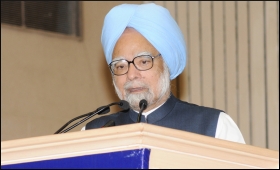|

|
New National Water Policy approved
|
|

|
|
| Top Stories |
 |
|
|
|
SME Times News Bureau | 29 Dec, 2012
The National Water Resources Council Friday approved the new National
Water Policy with Prime Minister Manmohan Singh saying legal structures
on water were inadequate and calling for judicious use of the resource.
Water Resources Minister Harish Rawat, after the meeting, said the new policy had been approved.
"We have improved on the 2002 policy to meet the challenges of the future," he said.
The
policy seeks to focus on the looming crisis in the water sector and lay
a roadmap on principles of equity, sustainability and good governance.
Rawat
said states had been assured that the proposed national water framework
law and the law on river basin management would be drafted only after
extensive consultations.
Sources said states such as Kerala, Bihar, Punjab and Madhya Pradesh have expressed reservations on some aspects of the policy.
They
said apart from concerns on the national water framework law
encroaching on their powers, some states had reservations on inter-basin
transfer of water. There were also demands for speedy resolution of
inter-state disputes.
Earlier, in his opening statement, the
prime minister said the country faced water scarcity and legal
structures dealing with water were inadequate.
He said planning for water use and distribution had to be done on the foundation of national vision.
He
called for a national legal framework on general principles of water
and said the country was approaching a critical juncture for the future
of water management.
He said there was a need to treat water as a
common property resource in a way that protected basic needs of
drinking water along with livelihood of poor farmers.
Manmohan Singh said water or the lack of it could become the limiting factor to social and economic growth.
"India already faces a scarcity of water, which is a vital and stressed natural resource," he said.
He
said one of the problems in achieving better water management was that
the current institutional and legal structures were "inadequate,
fragmented and need active reform".
The prime minister said
suggestions had been made for a national legal framework of general
principles on water, which, in turn, would pave way for essential
legislation on water governance in every state.
"The framework
would be an umbrella statement of general principles governing the
exercise of legislative, executive or devolved powers by the centre,
states and local governing bodies," he said.
The prime minister called for a paradigm shift in approach to water issues.
"We
need to rise above political, ideological and regional differences and
also move away from a narrow project-centric approach to a broader
holistic approach to issues of water management."
He said
groundwater levels were falling in many parts due to excessive
withdrawals, leading to contamination with fluoride, arsenic and other
chemicals.
The prime minister said there was no regulation for extraction of groundwater and its coordination among competing uses.
He
said rapid economic growth and urbanisation were widening demand supply
gap, water bodies were getting polluted by industrial waste,
groundwater levels were falling due to excessive withdrawals and there
was contamination with fluoride, arsenic and other chemicals.
The prime minister said water security was an issue on which the country would swim or sink together.
The
new water policy calls for integrated water resource planning at the
basin level, preservation of river corridors, mapping of acquifers,
water use efficiency, setting up of water regulatory authority by
states, removal of urban and rural disparities in distribution of water
and differential pricing.
It also calls for involvement of local communities in the management of water.
|
|
|
| |
|
|
|
|
|
|
|
just save rivers, undergroung level from pollution
kailash | Sat Dec 29 12:26:46 2012
govt policies are made with bad intentions just to pocket the money themselves ,say bureaucrats, policy makers and corporates with political links. We need to just keep the water resources safe from pollution and that's it. why allow to release the polluted,wastage/garbage of cities and industries, in the rivers? how can town planners release polluted water,sewerage in rivers? believe me huge big Dams and water treatment plants are big frauds/very big business. Yes, we need treatment plants/desalination to turn non drinkable water into safe drinking water.

|
|
|
|
|
|
|
| |
| Customs Exchange Rates |
| Currency |
Import |
Export |
US Dollar
|
66.20
|
64.50 |
UK Pound
|
87.50
|
84.65 |
Euro
|
78.25
|
75.65 |
| Japanese
Yen |
58.85 |
56.85 |
| As on 13 Aug, 2022 |
|
|
| Daily Poll |
 |
 |
| PM Modi's recent US visit to redefine India-US bilateral relations |
|
|
|
|
|
| Commented Stories |
 |
|
|
|
|
|
| |
|